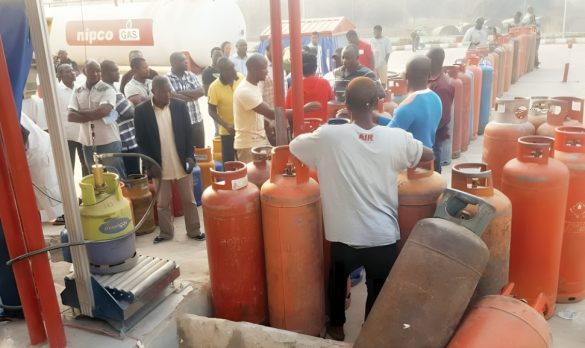KEY POINTS
- Soaring LPG prices are pushing Nigerians to abandon clean cooking energy.
- Vendors and low-income earners struggle as profit margins collapse.
- Retailers blame rising depot and transport costs for the sharp increases.
Nigeria’s push toward clean energy is facing an uphill battle as the price of cooking gas continues to surge nationwide.
What was once a cheaper and healthier alternative to firewood has now become an expensive luxury for many households, threatening to reverse years of progress in the country’s clean energy transition.
Across major cities such as Abuja and Lagos, the cost of Liquefied Petroleum Gas (LPG) has risen dramatically in the past month.
A 12.5kg cylinder that sold for around N9,000 in early September now costs as much as N16,500 in some areas.
Field checks show that in Abuja’s Karu, Nyanya, and Mararaba neighbourhoods, prices range between N1,200 and N1,600 per kilogram, depending on the outlet.
In Lagos, the situation is only slightly better. Earlier in October, residents were paying as high as N3,000 per kilogram, but recent checks indicate a slight retreat to between N1,300 and N1,500 in places like Apapa, Surulere, and Bariga.
Even so, the cost of refilling a 12.5kg cylinder remains above N20,000 in several parts of the city, a sharp rise from N10,000 barely two months ago.
Vendors and Low-Income Earners Hit Hard
The spike is squeezing small food vendors, restaurant owners, and low-income households already battling Nigeria’s high cost of living.
For Mrs. Blessing Ogar, a food vendor in Mararaba, the price of gas has upended her business. “Cooking gas used to be the cheapest and cleanest option, but now it’s like gold,” she said. “I tried going back to charcoal, but even that is becoming expensive.”
Another vendor, Ms. Esther in Gwarimpa, said she spent N18,125 refilling her 12.5kg cylinder, an increase of more than N3,000 in just weeks. “Customers will leave if I raise food prices too much. At this point, there’s barely any profit left,” she lamented.
Civil servants and other low-income earners share similar frustrations. “I used to fill my cylinder for N8,500 last year. Now it’s N15,000. How do ordinary people survive this?” asked Mr. Musa Abdul, a resident of Nyanya.



